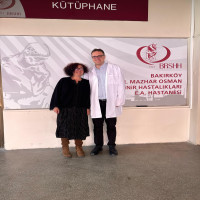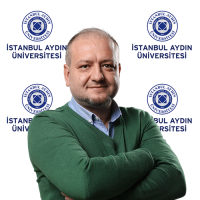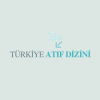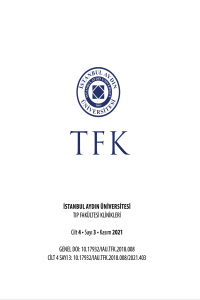Review
Research Article
Case Report
Aim & Scope
Aydin Medical Clinics is the official publication of Istanbul Aydin University, Faculty of Medicine that
offers scientific content. It is printed 4 times in a year in the months of February, May, August and November.
Aydin Medical Clinics is an international journal based on peer-review consultation principles publishing
clinic and basic science, original research articles, reviews, editor views and case reports in every field of
medicine.
Aydin Medical Clinics does not request application or process fees. Also, it does not pay any kind of
compensation or fee for the published articles.
The journal aims to publish research, original work, review and case reports that contribute in its field on
national and international levels in basic medical sciences and clinical branches.
Author Guidelines
Aydin Medical Clinics is an international journal based on peer-review consultation principles publishing
clinic and basic science, original research articles, reviews, editor views and case reports in every field of
medicine.
Aydin Medical Clinics does not request application or process fees. Also, it does not pay any kind of
compensation or fee for the published articles.
The journal aims to publish research, original work, review and case reports that contribute in its field on
national and international levels in basic medical sciences and clinical branches.
Ethical Principles and Publication Policy
Principles of Research and Publication Ethics
In scientific papers sent to TFK, the guidelines related to the Scientific Research and Publication Ethics of Higher Education Institutions, the recommendations of the International Committee of Medical Journal Editors and the International Standards for the Authors and Authors of the Committee should be taken into attention. Plagiarism, forgery in the data, misleading, repetition of publications, divisional publication and individuals who do not contribute to the research are among the authors are unacceptable practices within the ethical rules. Legal actions will be taken in case of any ethical irregularity related to this and similar practices.
a)Plagiarism: Placing the original ideas, methods, data, or works of others, partly or completely, without making reference to the scientific rules, is dealt with in the context of plagiarism. In order to avoid plagiarism, the authors should refer to the scientific rules in a manner that is appropriate and should pay attention to the references of all scientific papers in their research.
b)Forgery of Data: The use of data that does not exist or is modified in scientific research is data in the scope of forgery. Authors should analyze their data in accordance with ethical rules and without exposing them to a change in validity and reliability during the process.
c)Detortion: Changing the records or data obtained from the study, showing the devices or materials that are not used in the research as used, changing or shaping the research results according to the interests of the people and organizations that are supported are considered within the scope of distortion. The authors should be honest, objective and transparent in the information they provide in relation to the research process. They should avoid violating the rules of ethics.
d)Repetition: Presenting the same publication as separate publications without referring to the previous publications is considered within the scope of repetition of publications. The responsibility for the publication of the publications submitted for evaluation in another place or in the evaluation process belongs to the authors. The authors should refrain from repeating the original and original research and they should pay attention to submit their original and original research.
e)Divisional Publication: The results of a research are discussed in the scope of dissemination and disseminating the results of the research in a way that disrupts the integrity of the research and disseminating it in more than one way, and publishing these publications as separate publications. The authors should consider the integrity of the research and avoid the divisions that will affect the results.
f)Authorship: The inclusion of people who do not contribute to the research or not to include the people who have contributed is considered within the scope of unfair writing. All authors should have contributed sufficiently to the planning, design, data collection, analysis, evaluation, preparation of the research and finalization of the research.
Ethics Committee Approval
"Ethics Committee Approval" is required for the following researches. An approved “Ethics Committee Approval ” must be obtained from the institution where the author of the article is located. Researches requiring from the Ethics Committee Approval are as follows:
Any kind of researches carried out with qualitative or quantitative approaches that require data collection from participants using questionnaire, interview, focus group works, observation, experiment, interview techniques,
· Usage of humans and animals (including material / data) for experimental or other scientific purposes,
· Clinical researches on humans,
· Researches on animals,
· Retrospective studies in accordance with the Law on Protection of Personal Data,
Also;
· Stating that “Informed consent form” has been taken in the case reports,
· Obtaining and specifying the permission of the owners for the use of scales, questionnaire, and photos belonging to others,
· Stating that copyright regulations are obeyed for the ideas and works of art used.
In these articles, “Ethics Committee Approval ” should be stated in the article. The articles should include the statement that Research and Publication Ethics are complied with.
Indexes
Journal Boards
Board of Editor

İstanbul Aydın Üniversitesi - Tıbbi Biyoloji Anabilim Dalı (İngilizce)


Scientific Board

İstanbul üniversitesi cerrahlaşa Tıp Fakültesi Tıbbi Mikrobiyoloji Anabilim Dalı’nda yüksek lisans ve doktora programlarını tamamlayarak özellikle Tıbbi Bakteriyoloji laboratuvarında deneyim kazandım. Çalışmalarım Tıbbi bakteriyoloji, tıbbi Viroloji, tıbbi parazitoloji alanında olmakla birlikte özellikle doktora ve sonrası Helicobacter pylori üzerinde odaklandım. 2017 yılında Doçent 2023 yılında profesör olarak atandım. Halen Samsun Üniversitesinde Tıp Fakültesinde görev yapıyorum.


 Web
Web
Editorial Board

 Web
Web

İstanbul Aydın Üniversitesi - Tıbbi Biyoloji Anabilim Dalı (İngilizce)


I graduated from the Department of Medical Biological Sciences at Istanbul University Cerrahpaşa Faculty of Medicine in 1995. I completed my master's and doctoral degrees in the Department of Medical Biology at Istanbul University Cerrahpaşa Faculty of Medicine. I received the title of Associate Professor in 2012 and Professor in 2018. I currently work in the Department of Medical Biology at Istanbul University Cerrahpaşa Faculty of Medicine. Since 2019, I have served as the Head of the Department of Basic Sciences at Istanbul University Cerrahpaşa Faculty of Medicine.







